The article by Darius Longarino reproduced below initially appeared on China File
Main take aways for us:
- Unusual tactics pay off: the campaign focused on a consultation process that usually gets little attention from the public. So with over 210,00 people submitting a request for Same-Sex Marriage, this created a sensation. Walking off the beaten track is always good in campaigning
- Faith moves mountains: “Many people believe it’s not yet time to legalize gay marriage . . . but if we don’t do anything, it’ll never ‘be time’. There is no ‘right time.’ There is just us making the time ‘right.’”
- A cause is legitimized when people who are not concerned support it: Mobilization of straight allies showed policymakers that they will have to respond not only to minority groups, but potentially to a majority audience.
- Political highjacking is a real threat and must be taken seriously: NPC official contemptuously referred to gay marriage alongside gun rights in the United States when justifying Hong Kong’s sweeping National Security Law, saying every country balances public order and freedom differently.
- It’s important to play into the national dominant narratives: The primacy that the Chinese government gives to families means that many LGBTQ issues can be productively framed within the discursive frameworks of family, marriage, and even “Chinese values” . . . and the demand for same-sex marriage is likely to garner more understanding and support from Chinese society.
- Glamour helps: Resplendent photos of a wedding ceremony between the apprentice of a famous dancer and her same-sex partner went viral on Weibo, racking up 670 million views.
- Harness people power: Not everyone can trend on social media or start an organization, so the Equal Marriage network is encouraging as many people as possible to become individual messengers. In that vein, advocates are befriending scholars and businesspeople hoping they can reach out on their behalf to officials and the public.
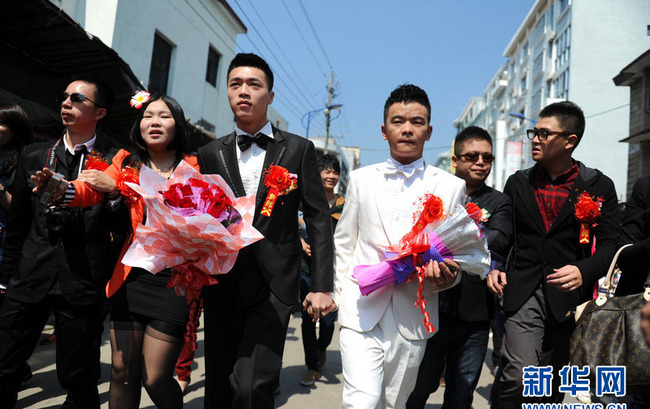
Andrew Stokols
Could Same-Sex Marriage Advocacy in China Be Poised for a Breakthrough?
Last fall, as China’s lawmakers neared finalizing the country’s first-ever Civil Code, they opened to public comment its draft chapters on marriage and other areas of law. A newly formed coalition of LGBTQ organizations advocating for gay marriage called Ai Cheng Jia (“Love Makes Family”) saw an opportunity. They could use the official comments process—which typically only receives anywhere from a few dozen to a few thousand submissions—to flood policymakers with calls for marriage equality.
It would be a push against the grain. China does not have a political analogue to the U.S. Christian right, but its LGBTQ movement faces its fair share of challenges from both state and society. Widespread public attitudes consider sexual minorities to be abnormal, even pathological, and counter to China’s cultural traditions of heterosexual marriage and passing down the family line through children. The ruling Communist Party, which is socially conservative and fixated on social control, censors LGBTQ-related content, pressures advocates, and has also cited tradition in opposing gay marriage.
But while the Party has curtailed LGBTQ speech and activism, it has not eliminated it, and China’s LGBTQ movement has proven savvy in capitalizing on narrow openings to increase visibility and support. Now, Ai Cheng Jia planned to use a state-sanctioned process to flip the script on marriage: Instead of letting others use China’s marriage tradition to marginalize sexual minorities, they would lay claim to it.
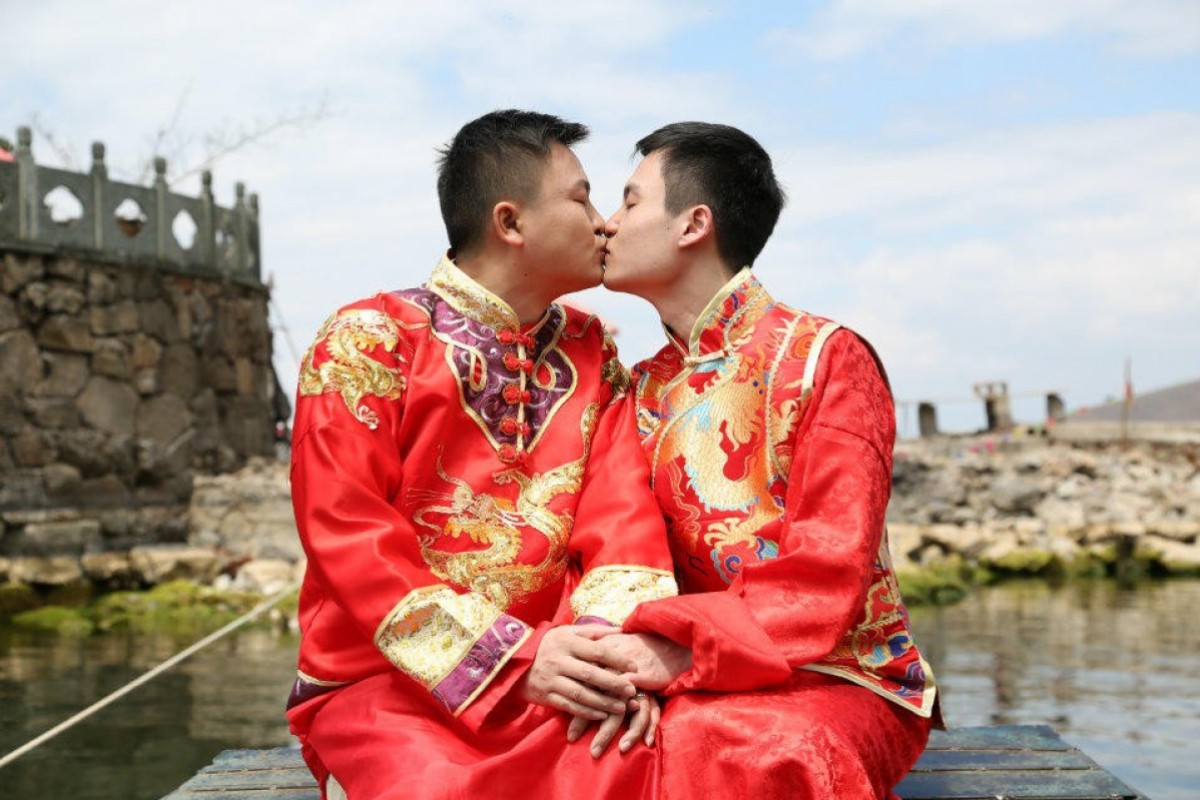
South Chine Morning Post
Ai Cheng Jia posted explainers online on how to formally submit comments to lawmakers calling for gay marriage, and created a Weibo hashtag “Civil Code Same-sex Marriage.” The campaign went viral beyond organizers’ expectations. In the first four days, the hashtag’s view count surged to 200 million before censors deleted it. Mercifully, whether for lack of capability or caring, censors did not ratchet up Internet controls, allowing supporters to keep spreading the word. In one such post, a Wuhan lesbian couple made a heartfelt appeal for why others should join this seemingly quixotic quest. “Many people believe it’s not yet time to legalize gay marriage . . . but if we don’t do anything, it’ll never ‘be time,’” they wrote. “There is no ‘right time.’ There is just us making the time ‘right.’” Ai Cheng Jia encouraged straight allies to join in, including parents of gays and lesbians, some of whom printed out family photos and mailed them in with proposals. The submission numbers climbed into the thousands, then tens of thousands, then hundreds of thousands.
By the close of the month-long comment period, a whopping 213,634 people had made submissions on the Code’s marriage chapter, absolutely dwarfing counts for other sections by orders of magnitude. The sheer scale was exciting, but when a National People’s Congress (NPC) spokesperson publicly acknowledged the large volume of calls for gay marriage, the social media champagne really uncorked. Celebratory posts cascaded down feeds. The state-run Beijing News created a hashtag about the spokesperson’s statement that reached 840 million views (though it later deleted its original post and removed itself as the hashtag creator).
The campaign fell short of achieving its ultimate goal; the final draft of the Code, passed in May, limits marriage to “man and woman.” But the fact the campaign mobilized so many people and got so much attention instilled a greater sense of agency in China’s LGBTQ community. “We will no longer be resigned to fate,” wrote Lengyi, a lesbian college student reflecting on the campaign. “My destiny belongs to me, and not to heaven.”
For Hongwei Bao, a professor at the University of Nottingham and author of Queer China, the campaign represented a “coming of age” for China’s LGBTQ advocacy groups. Advocates effectively used official discourses and procedures to advance their goals, and the campaign reflected a “collective voice, jointly articulated by ordinary LGBTQ people, their parents, friends, and straight allies” instead of just being centered around well-known individuals, as past actions had been. Ai Cheng Jia’s mobilization of straight allies also showed policymakers that they will “have to respond not only to minority groups, but potentially to a majority audience,” Bao said.
Bao also sees the government acknowledgement as a “significant gesture for China’s LGBTQ communities.” According to Peng Yanhui, director of LGBT Rights Advocacy China, an Ai Cheng Jia member group, the official response was crucial for making campaign participants feel empowered. “If there was no response, people would think their participation meant nothing. But now people want to keep going because they expect a response,” Peng said.
A one-time acknowledgement may seem like a low bar, but it was an improvement. Throughout the 2000s, Professor Li Yinhe from the Chinese Academy of Social Sciences tried submitting gay marriage proposals to lawmakers several times. In 2006, the People’s Daily website republished an opinion piece in response to Li, “Can Our Sexual Morality be Raped?” The same year, a People’s Political Consultative Conference (CPPCC) member flippantly rebuffed Li, saying, “First, I don’t understand law. Second, I don’t understand love.” More promisingly, a CPPCC spokesperson’s response to Li was that gay marriage was “too ahead of the times.” Li hailed the statement as progress. The spokesperson later denied saying it.
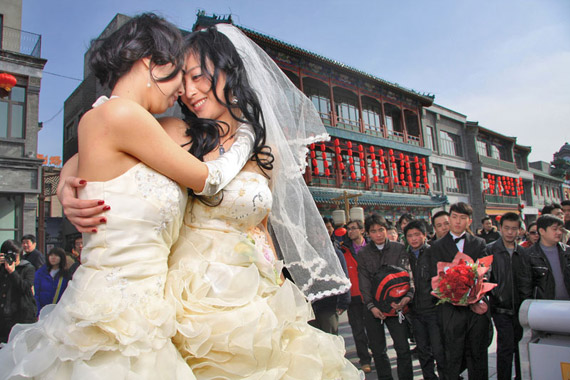
Sup China
Zhou Dan, a lawyer and early gay rights activist in China, cautions not to get too excited about the NPC’s recent acknowledgment. “We should be very clear-eyed about the severity of anti-gay sentiments in China,” he told me. Officials have repeatedly dismissed gay marriage as contradicting Chinese culture and traditions. In May, a lead drafter of the Civil Code tried to discredit the submissions calling for gay marriage, saying they were “organized” and “copied and pasted.” More worryingly, another NPC official contemptuously referred to gay marriage alongside gun rights in the United States when justifying Hong Kong’s sweeping National Security Law, saying every country balances public order and freedom differently.
The obstacles to pushing for gay marriage from the bottom-up in an authoritarian state are many, but China’s LGBTQ movement is poised to keep pressing for it, which is itself a notable development. Historically, gay marriage has been a low priority for LGBTQ groups, often considered by advocates to be too hopeless or insufficiently urgent. But now, more same-sex couples are building lives and families together, and they want access to marriage’s very practical bundle of rights that affect everything from property to parenting. Hu Zhijun, the director of PFLAG China (Parents, Families and Friends of Lesbians and Gays), an Ai Cheng Jia member organization that encourages parents and other family members to support their LGBTQ children, estimates that 100,000 children are being raised by queer families in China. However, only one parent in a same-sex partnership can establish a legal relationship with their child, leaving the other parent’s relationship to the child in a precarious position. The romance of marriage has also prompted many couples to go abroad just to “make it official,” so to speak, even though their marriages have no legal effect when they return to China.
And there is another powerful motivation, including for people with no intention to marry: desire for equality. With such great importance attached to marriage, being denied marriage rights is a conspicuous mark of stigma. PFLAG China’s Hu said that parents who are learning to accept their gay and lesbian children “are really concerned about marriage. They think that you are a second-class citizen, that you are not a real person because the government doesn’t recognize you.” In media and in-person conversations, people often use “gay legalization” (“同性恋合法化”) as shorthand for the legalization of gay marriage. This logic was on display when the Hunan Civil Affairs Department rejected a gay rights organization’s registration in 2013, reasoning that the Marriage Law does not permit same-sex marriage and thus the organization’s registration request “lacked legal basis.” In a 2020 court case, a publisher defended a textbook that claims homosexuality is a mental illness by referring to the Marriage Law, even though China ostensibly officially depathologized homosexuality in 2001. Achieving marriage equality would send a powerful message to society that lesbian, gay, and bisexual people and their bonds of love and family have equal dignity.
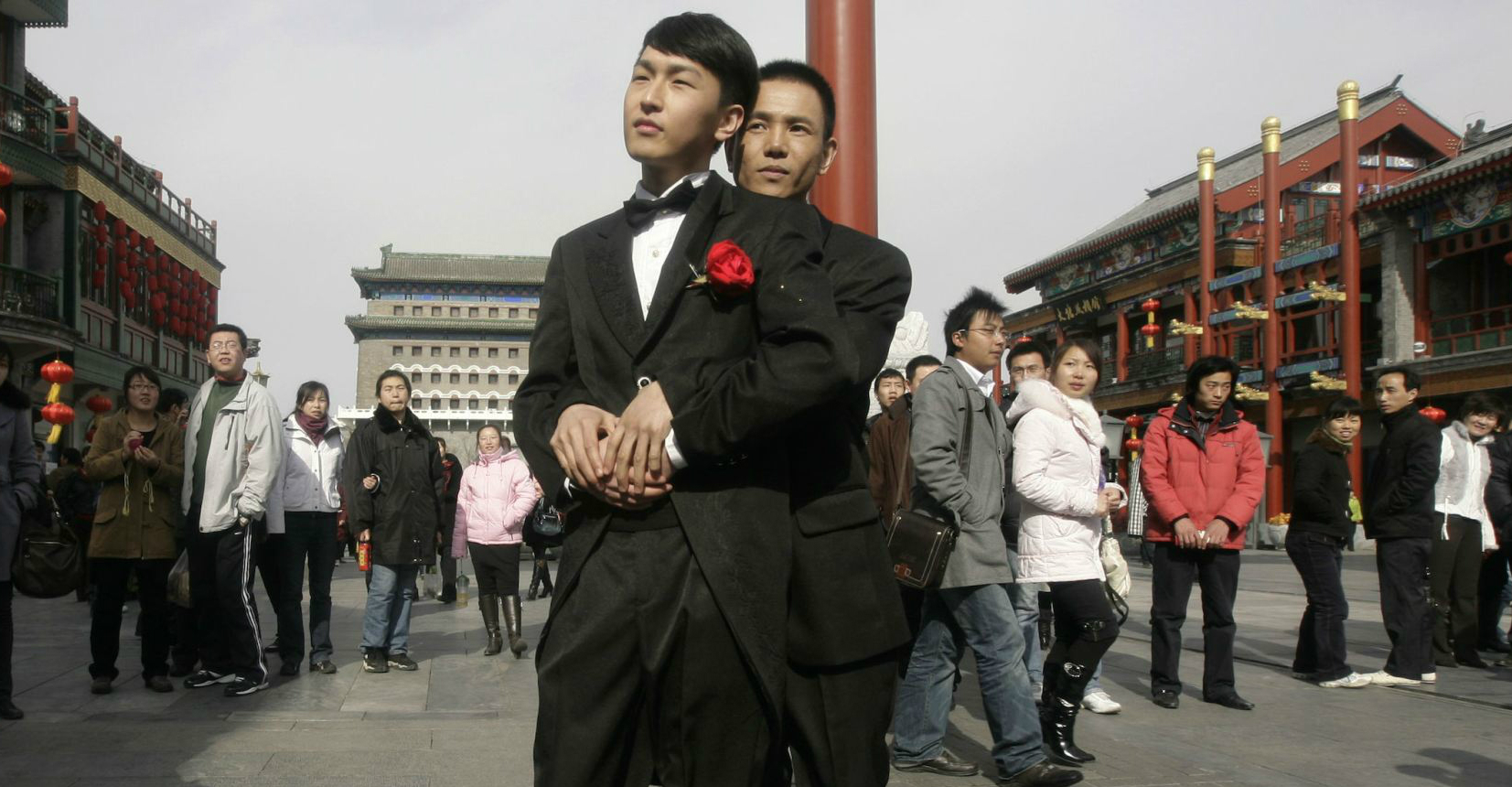
Queer Comrades
There is also a belief among many LGBTQ advocates that fighting for marriage could be a boon to the movement. According to Bao,
The primacy that the Chinese government gives to families means that many LGBTQ issues can be productively framed within the discursive frameworks of family, marriage, and even “Chinese values” . . . and the demand for same-sex marriage is likely to garner more understanding and support from Chinese society. . . As such, marriage equality is likely to be one of the most important ways for LGBTQ people to counter social stigma and to fight for their rights in China.
Indeed, Ai Cheng Jia’s members have seen how marriage’s emotionally powerful and widely-understood language of love and family can transform and electrify. They’ve seen how parents who couldn’t initially accept their gay child later beam with joy at their child’s gay wedding ceremony, and how when Sun Wenlin (who later became a leading Ai Cheng Jia member) and his same-sex partner, Hu Mingliang, sued for a marriage license in 2016, hundreds of people excitedly descended on the courthouse to be part of the moment. “If you want a movement, you should move people,” as Zhou likes to say—and marriage moves.
Going forward, gay marriage advocates aim to grow support among key decision-makers and a critical mass of the public, an already heavy lift made all the more difficult by state repression. The threat of the Party’s security apparatus further tightening the screws is ever-present. In August, organizers of the long-running and iconic ShanghaiPRIDE festival disbanded due to increased harassment from authorities. Then, there is the challenge of getting one’s message out in China’s highly controlled information environment. “For the public, we know we need to talk about love, mutual caring, and family,” said Peng, “but because of media censorship, we don’t have enough channels to reach them.” Advocates say controls are becoming more stringent, with online platforms blocking or throttling LGBTQ content.
However, there still seems to be room for maneuver. Ai Cheng Jia member advocates have been supporting Zhang Peiyi, a woman who is suing her same-sex partner in court for custody of their two children. The risk that the court could refuse Zhang her parental rights has sparked extensive discussion online. And in June, resplendent photos of a wedding ceremony between the apprentice of a famous dancer and her same-sex partner went viral on Weibo, racking up 670 million views.
Not everyone can trend on social media or start an organization, so the Ai Cheng Jia network is encouraging as many people as possible to become individual messengers. “We need more people to influence the people immediately around them,” said PFLAG’s Hu. “You don’t have to do something really big. You just need to do it within the scope of your life.” In that vein, advocates are befriending scholars and businesspeople hoping they can reach out on their behalf to officials and the public.
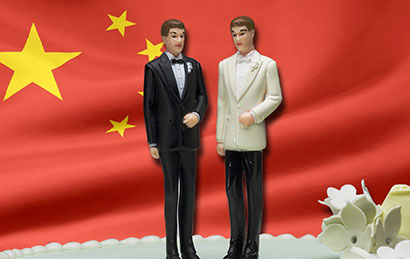
If they can get in front of power-holders, gay marriage advocates say they want to be able to stir emotions and educate minds. Ai Cheng Jia groups are partnering with scholars to prepare research reports on how many people support—and need—gay marriage, and the benefits China could reap, whether economic, demographic, health-related, or otherwise. They are trying to speak in terms the government would understand, but data has it limits. For PFLAG’s Hu, “I always go back to personal stories. It’s more important to move their hearts than their reasoning.”
Advocates expect progress to be gradual, with the government slowly and inconspicuously opening access to rights that address practical needs piecemeal but fall short of legalizing gay marriage. “Their attitude is to give a little here and a little there, and say, ‘don’t make any more trouble!’,” said Dong Xiaoying, director of the Advocates for Diverse Family Network, an Ai Cheng Jia member group. For example, the government has started allowing adults, regardless of gender, to become legal mutual guardians and provide property protections to each other.
“We welcome it, but it is not enough,” said Peng. The ultimate goal is equality, and half-measures are not going to quiet gay marriage advocates. Instead, Peng says they will use whatever concessions they get to tell more stories and create more discussion. After the Civil Code’s passage, Sun Wenlin launched an app that gives unofficial marriage certificates to same-sex couples seeking to wed, which more than three thousand couples have used so far.
“They will only give us something when our voice is loud,” said Peng.
“Always ask for more.”
